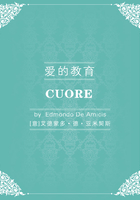
Sunday, 11th. The Army
The National Festival Day postponed for a week on account of thedeath of Garibaldi.
We have been to the Piazza Castello,to see the review of soldiers,who defiled before the commandant of the army corps,between two long lines of people.As they marched past to the sound of trumpets and bands,my father pointed out to me the corps and the glories of the banners.
First,the pupils of the Academy,those who will become officers in the Engineers and the Artillery,about three hundred in number,dressed in black,passed with the bold and easy elegance of students and soldiers.After them defiled the infantry,the brigade of Aosta,which fought at Goito and at San Martino,and the Bergamo brigade,which fought at Castelfidar-do,—four regiments of them,company after company,thousands of red aiguillettes,which seemed like so many double and very long garlands of bloodcolored flowers,extended and shaken from the two ends,and borne across the crowd.
After the infantry,the soldiers of the Mining Corps advanced,—the workingmen of war,with their plumes of black horse-tails,and their crimson bands;and while these were passing,we beheld advancing behind them hundreds of long,straight plumes,which rose above the heads of the spectators;they were the Alpine troops,the defenders of the portals of Italy,all tall,rosy,and stalwart,with hats of Calabrian fashion,and lapels of a beautiful,bright green,the color of the grass on their native mountains.
The mountaineers were still marching past,when a stir ran through the crowd,and the“bersaglieri”,the old twelfth battalion,the first to enter Rome through the breach at the Porta Pia,bronzed,alert,brisk,with fluttering plumes,passed like a wave in a sea of black,making the piazza ring with the shrill blasts of their trumpets,which seemed like shouts of joy.But their trumpeting was drowned by a broken and hollow rumble,which announced the field artillery;and the latter passed in triumph,seated on their lofty caissons,drawn by three hundred teams of fiery horses,—those fine soldiers with yellow lacings,and their long cannons of brass and steel gleaming on the light carriages,as they jolted and resounded,and made the earth tremble.
Then came the mountain artillery,slowly,gravely,fine in its heavy,solid way,with its large soldiers,and its powerful mules-that mountain artillerywhich carries dismay and death wherever man can set his foot.And last of all,the fine regiment of the Genoese cavalry,which had wheeled down like a whirlwind on ten fields of battle,from Santa Lucia to Villafranca,passed at a gallop,their helmets glittering in the sun,their lances erect,their pennons floating in the air,sparkling with gold and silver,filling the air with jingling and neighing.
“How beautiful it is!”I exclaimed.My father almost reproved me for the words,and said:“You are not to regard the army as a fine show.All these young men,so full of strength and hope,may be called upon any day to defend our country,and fall in a few hours,crushed to fragments by bullets and grape-shot.Every time that you hear the cry,at a feast,‘Hurrah for the army!Hurrah for Italy!'picture to yourself,behind the regiments which are passing,a plain covered with corpses,and red with blood,and then the greeting to the army will proceed from the very depths of your heart,and the image of Italy will appear to you more severe and grand.”